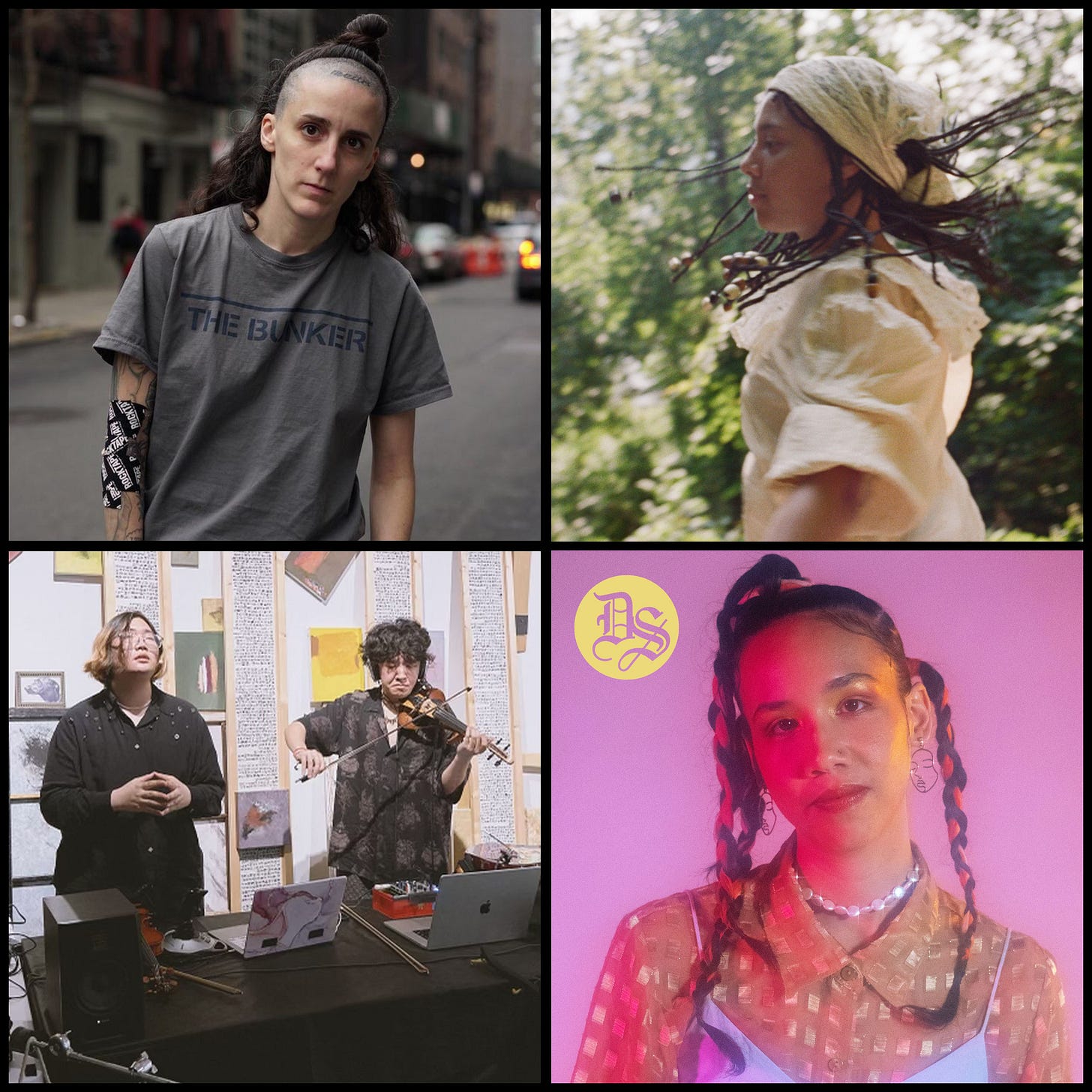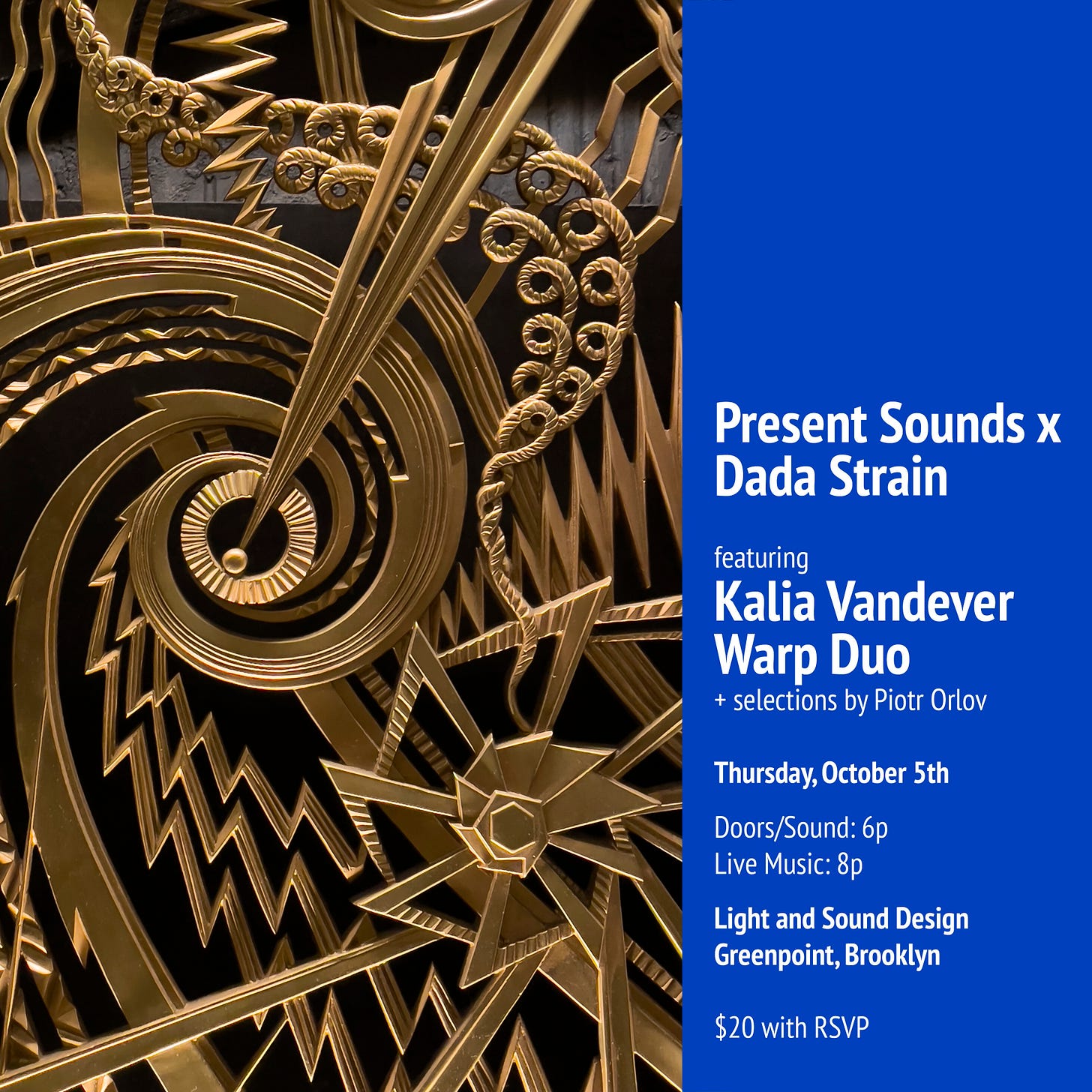Bklyn Sounds 10/4/2023-10/10/2023 + Kalia Vandever and Warp Duo
Short profiles of artists playing Thursday's Dada Strain event + Shows: June McDoom / Lauren Flax + Mike Simonetti / Tcheser Holmes + Lesley Mok + Booker Stardrum & Chris Williams / Livwutang / ...
On Thursday, October 5th, Dada Strain will present its second live collaboration with “Present Sounds,” a deep listening series that takes place every week in a private Greenpoint loft. Dada Strain’s contribution to “Present Sounds” features improvised music that engages electronics; and this night will present music from two acts, Kalia Vandever, a trombonist who uses pedals to affect her sound, and Warp Duo, Levi Lu and Scott Li, whose sound combines traditional instruments, homemade technology and electronic gear.
As always, I figured it was worthwhile to speak to Kalia, Levi and Scott, to paint short profiles of their histories as artists, their perspectives on electronics and improvisation, and to get a sense of how they’ve arrived at the music they make.
Kalia Vandever
If you pay attention to the development and growth of young players in New York’s musical hothouse, chances are good you were familiar with Kalia Vandever before this past April, when the 28 year-old trombonist released her first solo album, We Fell In Turn. A Juilliard graduate who’d already led on two well-received small-group “jazz” records, Vandever was playing and recording alongside some of her conservatory-student colleagues currently becoming the next generation of jazz’s bold-face names, folks like Immanuel Wilkins, Joel Ross and Micah Thomas. Vandever seemed on a similar trajectory. She had picked up the trombone at age 8 after hearing Delfayo Marsalis via her dad’s jazz collection, came to New York from the Los Angeles County High School for the Arts, where she was tutored by saxophonist Walter Smith III; and long before finishing her studies, began stretching out as a trombonist-for-hire to pop artists like Demi Lovato, Lizzo, Moses Sumney and Harry Styles (whose world tour she went on this year). “Living in New York,” she says, “I knew that I wanted to play a lot of different kinds of music.”
Yet that work feels secondary next to We Fell In Turn, a gorgeous, emotional blossoming of horn, guitar-pedal textures and loops, used in the service of largely improvised melodies. It is one of 2023’s stand-out albums. There’s a gentle simplicity to the music, a mix of sweetness and sorrow that makes sense of a project Vandever began developing as a way to “push boundaries on my instrument,” but more fully realized in the loneliness of lockdown. “There are days [when] this sound fills my whole body and feels really good,” she says. “I wanted to interact with that [feeling] in a way that wasn't fully acoustic. That's what drew me to electronics.” Vandever wasn’t sure how to document this process or the work itself, describing her relationship with recording as something that “doesn’t feel very natural.” So she and engineer Lee Meadvin decamped for an Upstate New York house, setting up “a bunch of microphones in a living room,” and recording all the released material in one day. And though she came into the sessions with initial sound sketches, “most of the stuff that we ended up putting out was improvised.” That lived-in air and the freshness of spontaneous compositions permeate the music.
Such resonances also translate to playing this material in front of audiences. “I think a lot of beauty comes from live performance,” Vandever says. She brought her relatively compact pedals on the Styles tour, and ended up playing intimate solo shows in Europe in-between the stadium extravaganzas. And she’s having fun with it, developing new solo pieces in the set with an eye towards making another solo album
“I know my sound better than anyone else, so the opportunity to interact with it and manipulate it is a cool world to delve into. Now that I'm learning how to use the gear more, there's possibilities to explore. The way I was treating electronics before was like, ‘Okay, this is something that I can add to what already exists.’ But now I'm like, ‘How can I manipulate this more, and have it sound different than my instrument?’ I'm trying to find that balance.”
Warp Duo
The members of Warp Duo, Qiujiang Levi Lu (they/them) and Scott Li (he/him), first met at the Baltimore apartment of a mutual friend two years ago. Li, who’d just finished up his undergraduate studies in computer music at the Peabody Institute, was looking to buy an electric violin. Lu, who was entering Peabody as a master’s candidate in computer music, had one to sell. The pair shook on it. A week later both were on the bill of an apartment show — Lu playing feedback patches that they created themselves, Li playing the violin he’d just purchased, and which instantly became one of his prized possessions. That evening, what had been a circumstantial connection became a bond.
Lu: “The second I heard Scott's music, it was just so powerful, so pure and emotional — it resonated a lot with me. I could hear so much from his music, to get to know this person just by seeing his performance. That made me genuinely cry for the first time, when attending a live show.”
Li: “Levi's reaction was so powerful. There's been very few times when someone has reacted to my music so strongly. And in that moment I felt such a strong connection to them. I was like, ‘They get it. They know what we're after. Like, we're probably after the same thing.’”
To hear them both talk about it, there was almost zero chance that the pair would not attempt a friendship and a collaboration. Though it took a moment for Warp Duo, named after a character in the anime Kaiba, to come to fruition. Their musical and cultural backgrounds were similar but superficially so. Lu, who was born in Beijing, comes at their practice from a variety of interests — singer and multi-instrumentalist, performance artist and free improviser, machine composer and academic (they are now a lecturer in the UPenn music department). Li, who was raised in Princeton by parents who’d immigrated from China, found his love for electronic music via dubstep and EDM, and became an accomplished studio-engineer, before his conservatory education exposed him to experimental noise and post-modern classical music, cutting his romantic streak. Nevertheless, says Li, “I think we have a yin-yang kind of relationship, where my simple harmonies and pop sensibility mix with the more experimental sound that I would say Levi is absolutely master of.”
What the pair do share is an intention to communicate directly through their sounds. “We're trying to make music that moves people and is very outwardly emotional,” says Li. “It's not like we're trying to be super intellectual, and make cool sounds, and be the most edgy. It's very much about communicating something real about life and memories to the people we love.”
Warp Duo’s performances utilize all of their various skill sets and sonic directions in improvisatory fashion, while also tailoring each show for set and setting:
“Every time we get together, we try to use technology in ways that we never thought before,” says Lu. “Then some of those experimentations or improvisations become one of the steps in our performance. We kind of customize each performance for the venue, for the audience, the vibe, and for the people on the bill. And also, how we feel on the day. So we will rearrange a bunch of sets in different orders where I could pick and choose what, what we wanna do for this particular performance. By doing so, we're trying to really keep the essence of what live performance means.”
(Present Sounds x Dada Strain pres. Kalia Vandever + Warp Duo + selections by Piotr Orlov, Thursday, October 5th, 6p (live music at 8p) @ secret Greenpoint Loft (RSVP for exact location) - RSVP/$20)
This Week’s Shows:
Keep reading with a 7-day free trial
Subscribe to Dada Strain to keep reading this post and get 7 days of free access to the full post archives.




